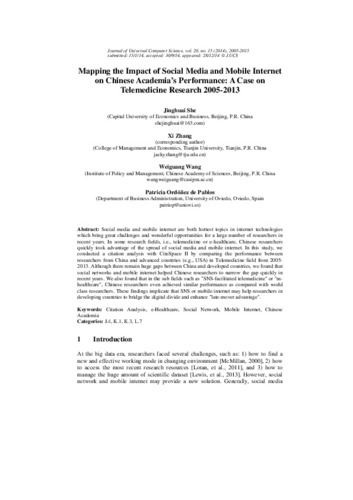Mapping the impact of social media and mobile internet on Chinese Academia's Performance: a Case on telemedicine research 2005-2013
Publication date:
Editorial:
Graz University of Technology, Institut für Informationssysteme und Computer Medien et al.
Publisher version:
Citación:
Descripción física:
Abstract:
Social media and mobile internet are both hottest topics in internet technologies which bring great challenges and wonderful opportunities for a large number of researchers in recent years. In some research fields, i.e., telemedicine or e-healthcare, Chinese researchers quickly took advantage of the spread of social media and mobile internet. In this study, we conducted a citation analysis with CiteSpace II by comparing the performance between researchers from China and advanced countries (e.g., USA) in Telemedicine field from 2005- 2013. Although there remain huge gaps between China and developed countries, we found that social networks and mobile internet helped Chinese researchers to narrow the gap quickly in recent years. We also found that in the sub fields such as "SNS-facilitated telemedicine" or "mhealthcare", Chinese researchers even achieved similar performance as compared with world class researchers. These findings implicate that SNS or mobile internet may help researchers in developing countries to bridge the digital divide and enhance "late-mover advantage"
Social media and mobile internet are both hottest topics in internet technologies which bring great challenges and wonderful opportunities for a large number of researchers in recent years. In some research fields, i.e., telemedicine or e-healthcare, Chinese researchers quickly took advantage of the spread of social media and mobile internet. In this study, we conducted a citation analysis with CiteSpace II by comparing the performance between researchers from China and advanced countries (e.g., USA) in Telemedicine field from 2005- 2013. Although there remain huge gaps between China and developed countries, we found that social networks and mobile internet helped Chinese researchers to narrow the gap quickly in recent years. We also found that in the sub fields such as "SNS-facilitated telemedicine" or "mhealthcare", Chinese researchers even achieved similar performance as compared with world class researchers. These findings implicate that SNS or mobile internet may help researchers in developing countries to bridge the digital divide and enhance "late-mover advantage"
ISSN:
Patrocinado por:
Science Foundation of Ministry of Education of China [13YJA630073]; National Natural Science Foundation of China [71201155]
Collections
- Administración de Empresas [512]
- Artículos [37532]
Files in this item




